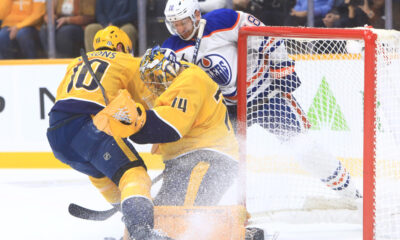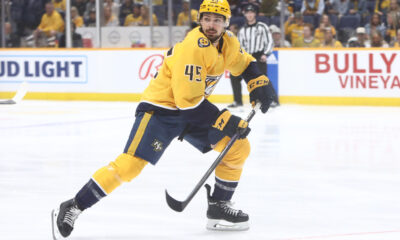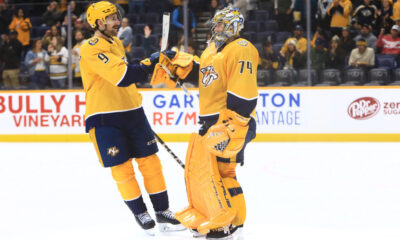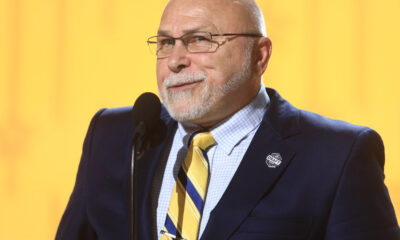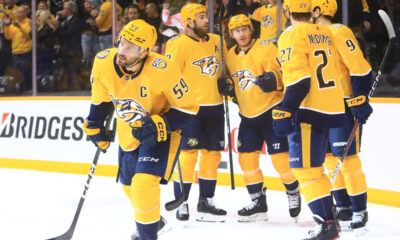A guest post by Callen Harrell:
Playing hockey is a national pastime and a dream for every young Canadian. However, some people have to work a little harder to make it in the sport. Scott Stafford, 23, of St. Thomas, Ontario, was born without his left hand. During birth, his umbilical cord was wrapped around his wrist, cutting off the circulation and the doctors were unable to save the hand. Stafford and his family were determined to give him the same quality of life as any other able-bodied person. He began skating at age three and playing organized hockey at age four.
Stafford went on to say, “I just wanted to be a regular Canadian kid and play hockey. I wanted to fit in and play on teams with my peers and my parents did their part and treated me like everyone else. I started out playing mini sticks and shooting in my basement. That led to learning to skate and then playing on the ice.”
“How does he hold and control the stick like other players?” you ask. Well, he doesn’t.
His parents, Wes and Shaunna Stafford knew this would be potentially problematic. Wes and Scott teamed up to find a way to hold the stick that was comfortable and efficient. “The top of my stick goes on my left forearm and my bottom hand and placement are just like any other player’s,” Stafford says.
Another potential problem would be lacing up his skates. Stafford said that his dad or his trainer would have to tie his skates up for him before games and practices. Now, after years of practice, Stafford boggles the minds of teammates all over by lacing up his own skates with just his right hand.
Stafford does have a great sense of humor about his disability. When playing golf with some friends and his cousin Brady Stafford, Scott joked sarcastically, “Look at it this way, Brady: If you win, you should feel pretty good about beating a guy with one hand. However, if you lose, you should feel pretty bad about losing to a guy with one hand.” Consequently, Scott lets you joke back too. After a good shot, Brady says, “Nice shot. Give yourself a hand there, Scooter.” Scott is very open about his disability and makes the most of it.
[pullquote align=”left|center|right” textalign=”left|center|right” width=”30%”]”I just wanted to be a regular Canadian kid and play hockey.”[/pullquote]
Some people with disabilities are reserved and often misjudged but that has not been Scott’s experience. “Growing up in a small community, everyone was pretty accepting and treated me like normal,” Stafford says. “People are always curious and ask questions. I’ve learned to just be open and honest about my disability and that makes them feel more comfortable.”
Similar judgments were expected to occur on the ice for Stafford, but he says it does not last long. “Once opponents see my ability, they play me just like anyone else,” Stafford says.
However, Scott was not content with just being able to play hockey. He set out to become a pro. “Since I was a young kid, my dream was to be pro hockey player,” he said. “It wasn’t until a couple of years ago that I realized that I may have the ability to make it to the pro level. I knew I was going to have to get better and develop my game every day, and I wanted to.”
Stafford worked his way up through Minor hockey (AAA); Elgin County Middlesex and St. Thomas Rep hockey; four years of Junior B Hockey in the GOJHL in Southern Ontario; Senior A hockey (Allan Cup Hockey); and even a stint with the Central Hockey League Denver Cutthroats where he played his first professional hockey game on October 11, against the Rapid City Rush.
The game of hockey has even allowed Scott to travel all over the world representing his native Canada. He has been to places like Prague, Czech Republic; Riga, Latvia; and even Tampere, Finland. Stafford has played with guys like TJ Brodie of the Calgary Flames, Nazem Kadri of the Toronto Maple Leafs, Logan Couture of the San Jose Sharks, and Jamie MacQueen of the AHL Norfolk Admirals. Other teammates of Stafford’s on the Dundas Real McCoys, like Jay McKee, Matt Barnaby, Ryan Christie and Nick Smith, also have NHL experience.
[pullquote align=”left|center|right” textalign=”left|center|right” width=”30%”]“It’s only a disability if you let it be.”[/pullquote]
Scott says that his parents, his teammates on the Canadian Amputee hockey team and even Jim Abbot, the MLB pitcher, motivate him. “Abbot is a great example of an amputee who was an elite athlete, and illustrated not only to me, but everyone else, that you can go far with hard work and perseverance,” Stafford said. “It’s only a disability if you let it be,” he added.
Stafford has tried his hand in other sports, such as golf, soccer and baseball; however, hockey is still his favorite. Scott has had an outstanding hockey career for a disabled player but he is still in pursuit of higher goals. He graduated last spring from Brock University in St. Catharines, ON, with a Bachelor’s Degree in Sports Management. Stafford added, “Hopefully, I can use my degree to get a job in sports, more specifically, hockey.”
Stafford is willing to wait on his off-ice career though. He has since been released by the Cutthroats but has been communicating with teams in the Southern Professional Hockey League for another pro-team shot and a step closer to the NHL.
About Callen:
A 2008 graduate of Lebanon High School in Lebanon, TN, Callen played baseball at Roane State CC where he received his Associates Degree before moving on to Tennessee Tech University where he received a Bachelor of Arts degree in Communications/Journalism with emphasis in Sports Media. He’s an avid follower of the Braves, Preds and Vols. On his iPod, you’ll find anything from Tupac to George Strait to Beethoven. Follow him on Twitter: @Cal_Harrell.


